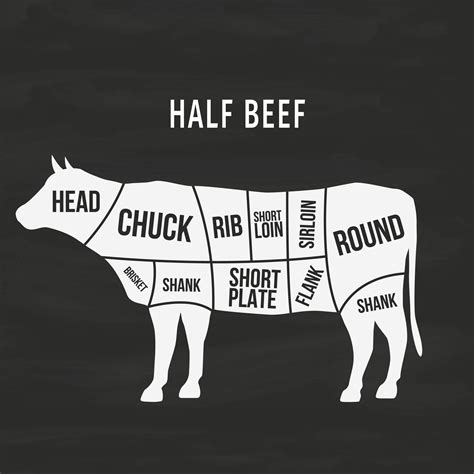Half a Cow: Delicious, Affordable, and Convenient
Buying half a cow might sound like an undertaking reserved for homesteaders and large families, but it's increasingly becoming a popular choice for budget-conscious consumers and families seeking high-quality, flavorful meat. This comprehensive guide explores the benefits, considerations, and practical aspects of purchasing and utilizing half a cow, showing why it's a delicious, affordable, and surprisingly convenient option.
What Does Buying Half a Cow Entail?
Buying half a cow involves purchasing approximately half the carcass of a cow, typically weighing between 300 and 400 pounds. This yields a significant quantity of various cuts, including steaks, roasts, ground beef, stew meat, and organ meats. The exact cuts and quantities will vary depending on the butcher and the cow's breed and size. You'll often work directly with a local farmer or rancher, establishing a direct connection to your food source and potentially learning about sustainable farming practices.
Is Buying Half a Cow Affordable?
The cost per pound of meat from a half-cow purchase is generally significantly lower than purchasing the same cuts from a grocery store. While the upfront cost is substantial, the long-term savings are considerable, especially for larger families or those who frequently consume beef. You're effectively buying in bulk, which always offers cost advantages.
How Much Does Half a Cow Cost?
The price varies considerably depending on location, breed of cow, and the current market price for beef. Expect to pay anywhere from $3 to $6 per pound, with the total cost often ranging from $1000 to $2500 or more. However, this price is spread out over several months, as you'll receive your meat in portions (often frozen), allowing for manageable monthly expenses.
Is Half a Cow Convenient?
While it requires upfront planning and freezer space, the convenience of having a consistent supply of high-quality meat outweighs the initial effort for many. You won't have to make frequent trips to the grocery store to buy beef, saving you both time and money.
How Do I Store Half a Cow?
Adequate freezer space is crucial. A chest freezer is ideal due to its greater capacity and better temperature regulation. You'll need to organize your meat efficiently, labeling each package with the type of cut and the date. Proper freezing and storage will ensure the meat stays fresh for many months.
What Cuts of Beef Will I Get?
The exact cuts you receive will vary, but you can usually expect a diverse range, including:
- Steaks: Ribeye, sirloin, tenderloin, New York strip
- Roasts: Chuck roast, brisket, short ribs
- Ground Beef: Perfect for burgers, chili, and tacos
- Stew Meat: Ideal for soups and stews
- Other Cuts: Ground beef, bone-in cuts, organ meats (liver, heart, kidney), etc.
You'll have the opportunity to discuss your preferences with the farmer or butcher to tailor the selection to your family's needs.
What are the Benefits of Buying Half a Cow?
- Cost Savings: Significantly lower price per pound compared to retail stores.
- High-Quality Meat: Direct sourcing often means higher quality, ethically raised beef.
- Knowing Your Source: Transparency regarding the animal's diet and treatment.
- Variety of Cuts: Access to a wide range of cuts you might not find in a typical grocery store.
- Reduced Food Waste: You use what you need, minimizing spoilage compared to buying smaller quantities regularly.
What are the Drawbacks of Buying Half a Cow?
- Upfront Cost: Requires a significant initial investment.
- Freezer Space: Requires substantial freezer space for storage.
- Processing Time: Allow time for the processing and delivery of the meat.
- Planning and Organization: Requires careful planning to use the meat efficiently before it spoils.
Frequently Asked Questions
How do I find a farmer or rancher who sells half a cow?
Many farmers' markets, local food co-ops, or online agricultural directories can connect you with local ranchers selling halves or quarters of beef. You can also search online for "buy half a cow [your location]".
What if I don't have enough freezer space?
Consider sharing a half-cow with a friend or family member to split the cost and the meat.
How long does the meat last in the freezer?
Properly stored beef can last in the freezer for 6-12 months.
What's the best way to preserve the meat?
Vacuum sealing is highly recommended to extend the shelf life and prevent freezer burn.
Buying half a cow is a significant commitment, but for many, the delicious, affordable, and convenient benefits far outweigh the initial investment. By carefully considering your needs and planning ahead, you can enjoy a plentiful supply of high-quality beef for months to come.

